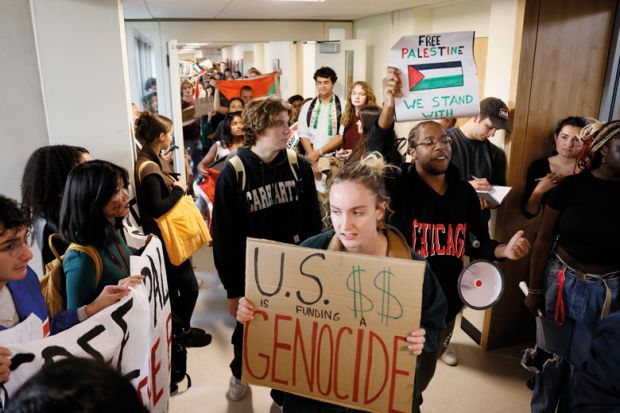Pushed by powerful politicians and donors arguing that US higher education has been too permissive with student protesters, the nation’s universities are increasingly quashing dissent with new types and severities of restrictions, punishments and arrests.
The actions – overwhelmingly aimed at pro-Palestinian activism – include Washington-based American University banning indoor protests, New York’s Barnard College outlawing all public protests and even signs in windows, and the University of Massachusetts Amherst blocking participants in a non-violent protest from joining their scheduled study abroad term.
Other recent moves against pro-Palestinian activism include large numbers of arrests at campuses that include the University of Chicago, the University of Michigan and Brown University, as well as two Northwestern University students subjected to criminal charges – later dropped – for distributing a parody newspaper.
“It represents a kind of mentality that is spreading – that the answer to this turbulence is just to make new policies that are going to shut down speech for everybody,” said Jonathan Friedman, the director of free expression and education programmes at PEN America, a writers’ group. “This is highly concerning, and very much the wrong answer to this problem.”
Students across the US began protesting on both sides of the Israeli-Palestinian divide after the October attacks by Hamas, and the Israeli military’s far more deadly response in Gaza. Major donors to universities and lawmakers, however, largely lined up on the side of Israel and rebuked college leaders for failing to join them. The repercussions have included the removals of the presidents of Harvard University and the University of Pennsylvania.
With that lesson as the backdrop, US universities have in recent weeks displayed stepped-up levels of determination and force against pro-Palestinian activism.
At Barnard – the women’s college inside Columbia University with a heavily Jewish student population – administrators responded to the campus’ only pro-Palestinian protest by using informants to track down suspected participants, including students who hung political banners from dormitory windows, and opening disciplinary processes against them. American University, in announcing its protest ban, said it, too, was acting to protect Jewish students.
At UMass, campus police arrested 56 students and one staff member at a sit-in outside the chancellor’s office. Among the repercussions, UMass barred two of the students from their planned study abroad semester. A spokesman said the university responded to all protests “in a content-neutral fashion”, but did not identify any reason why the response differed from the previous major sit-in at the main administration building, in 2016, when students demanding fossil fuel divestment were released without university sanction for their arrest.
At Chicago, students arrested in a protest described disproportionately worse treatment of those wearing traditional Arab and Muslim clothing – a complaint that the university denies. At Michigan, students described a massive police response to a sit-in protest against the Israeli military held at the main campus administration building, including officers with riot shields.
At Brandeis University – founded by Jewish leaders in 1948 – police arrested students who had been walking through campus shouting pro-Palestinian chants. Brandeis also is among several US institutions that have moved to ban their campus chapter of Students for Justice in Palestine, leading students in some locations to form similar groups with different names.
New York University, the University of Arizona, Indiana University and Pomona College are among numerous institutions that have suspended or fired faculty for expressions of pro-Palestinian sentiment. That also has happened to instructors voicing pro-Israel sentiments, although reports have suggested that such action occurs less frequently.
Irene Mulvey, president of the American Association of University Professors, said university leaders “must stand up for our students’ right to hear and to express themselves, so that we model the conditions for respectful disagreement”.




